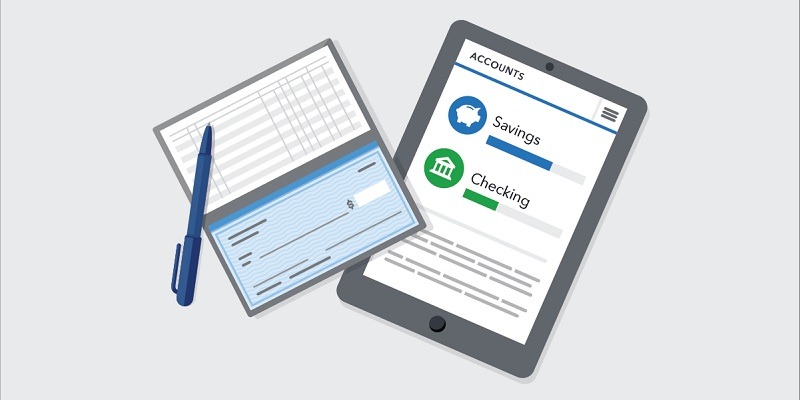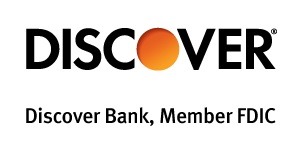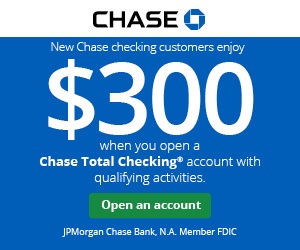
Opening your first bank account can be scary! Who knew there are so many different types of bank accounts out there? Most banks offer Savings Accounts, Checking Accounts, Money Market Accounts, Certificates of Deposits, Retirement Accounts and more.
Different bank accounts serve different purposes some excels at earning interest while others maximize convenience factor. It is important familiarize yourself with all the available banking options before open an account and put your money into someone else’s hands.
Financial institutions across the nation offer special incentives when you open a bank account, be informed on the general benefit & drawbacks of different accounts.
Interested in banking with Chase? See our list of Chase Coupons!
Savings Account
A Savings Account is a great introductory bank account anybody looking to store money in a bank. Anyone can open a Savings Account, even kids may do so with some assistance from a parent. A savings account is a better alternative to storing money under your mattress because account holders earn interest based on deposit amounts. Make your money work for you!
Though, savings account typically give lower interest rates than the likes of Certificate of Deposit and Money Market Accounts. Another downside to savings account is that most banks place limitations on numbers of withdrawals can be made in a specific time period. This is an ideal place for an emergency fund.
Checking Account
If you need to make frequent withdrawals, deposit checks, pay bills and likes to keep a relatively small balance then you need a Checking Account. Checking Account maximize the accessibility to between you and your money on a day-to-day basis. Most financial institution issue debit cards, checks, and grant access to 24/7 ATM machines at your convenience.
Banks are also starting to offer online bill pay services via Checking Account. Debit cards are becoming increasingly popular to the point where merchants may accept a variety of payment options. Pick a debit card that is tailored to your spending habits, different cards offer incentives & cashback rewards on your every purchase. Some financial institutions may charge maintenance fees and require minimum balance, but there are plenty more that does not.
Compare Checking Accounts
 |
Money Market Account
Can’t decide whether you prefer a Checking or a Savings Account? If you want the best of both worlds and reap all the benefits then get a Money Market Account. Money Market Account typically give depositor higher interest rate than that of a Savings or Checking Account, the trade off being account holders may not withdrawal as frequently as a Checking Account. It important to note that withdrawals are typically limited to 6 per statement cycle.
The drawback that turn some people away from this account is the possibility of high minimum balance requirement. Those interested in earning high interest from Money Market Accounts should expect minimum balance requirements ranging from $5,000 to $10,000.
Compare Money Market Accounts
 • Get started and open a Discover® Money Market Account in 3 easy steps. • Available nationwide online • Earn high yields with flexible access to your cash. • Earn 3.45%% APY balances $100,000 and over • Earn 3.40% APY balances under $100,000 • No hidden fees. No surprises. • Easy cash access via debit or check, or via ATM at over 60,000 no-fee ATMs |
Certificate Of Deposit
A Money Market Account is fairly liquid in comparison to a Certificate of Deposit (CD), but a CD usually gives the highest rate out of all aforementioned accounts. CD is much like a Savings Account in the fact that it earns interest and virtually risk free. When you get to a CD, you are making the commitment that you are parting with your money for the duration of term length.
Term length may range from a month upward to 10 years and is agreed upon beforehand. Account holders face steep charges for withdrawing early, in some cases banks may deny withdrawal request. This account is great for those that want to earn high interest and happen to have money left over aside from emergency funds.
| Service Credit Union | 4.25% APY 9-Month CD | Review |
| Western Alliance Bank | 4.50% APY 3-Month CD | Review |
| Western Alliance Bank | 4.40% APY 6-Month CD | Review |
| First Tech Federal Credit Union | 4.35% APY 13-Month Share Certificate | Review |
| Sallie Mae | 4.35% APY 10-Month CD | Review |
| Western Alliance Bank | 4.25% APY 12-Month CD | Review |
| Ponce Bank | 4.25% APY 3-Month High Yield CD | Review |
| Sallie Mae | 4.25% APY 14-Month CD | Review |
| Ponce Bank | 4.15% APY 4-Month No-Penalty CD | Review |
| Live Oak Bank | 4.10% APY 12-Month CD | Review |
| Live Oak Bank | 4.10% APY 12-Month Business CD | Review |
| First Mid Bank & Trust | 4.08% APY 9-Month CD | Review |
| Discover Bank | Up to 4.00% APY CD | Review |
| Sun Canyon Bank | 3.87% APY 11-Month CD | Review |
| Western Alliance Bank | 3.85% APY 5-Month CD | Review |
| Quontic Bank | Up to 3.75% APY CD | Review |
| GreenState Credit Union | 3.65% APY 10-Month CD | Review |
| Blue Federal Credit Union | 3.55% APY 15-Month CD | Review |
| Blue Federal Credit Union | 3.50% APY 9-Month No Penalty CD | Review |
| CIT Bank | 3.50% APY 13-Month CD | Review |
| CIT Bank | 3.50% APY 11-Month No-Penalty CD | Review |
| Southwestern National Bank | 3.40% APY 8-Month CD | Review |
| Ponce Bank | 3.00% APY 1-Month High Yield CD | Review |
| CIT Bank | 3.00% APY 6-Month CD | Review |
| CIT Bank | 3.00% APY 18-Month CD | Review |
Retirement Accounts
As the name suggests, a retirement account is geared toward retirement planning. Start saving for the future before it is too late, make sure to use Retirement Accounts since they offer tax advantages. Most banks offer Traditional IRAs as well as Roth IRAs, both IRAs can help ease tax burden but take different approaches.
It is up to the individual to choose a preferred way of saving money. A big drawback is account holders must meet specific requirements and there are extreme penalties imposed on early withdrawal.
| PROMOTIONAL LINK | OFFER | REVIEW |
| J.P. Morgan Self-Directed Investing | Up to $700 Cash | Review |
| TradeStation | $3500 Cash | Review |
| WeBull | 12 Free Stocks & free trades | Review |
| SoFi Invest | $25 Bonus and free trades | Review |
 |
 |
Bottom Line
It can be daunting when it comes to opening a bank account so read up and be prepared! It is vital to choose one that is best suited to your needs so you can reap the most benefits.
High interest rate and little to no fees are primary benefits that comes to mind but remember to factor in convenience.
There is no bank account that is universally perfect for everyone, after all each person is unique individual with specific financial needs & resources.
I recommend you carefully compare & contract all your options and make an informed decision!
You can view some of the best accounts from institutions like Chase, HSBC, Huntington, TD, CIT, BBVA, Discover, and more!




